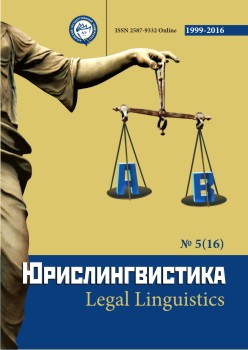ON THE STATUS OF WORD "BESTOLOCH" (WALLY) IN THE RUSSIAN LANGUAGE AND ITS INTERPRETATION IN LINGUISTICS AND JURISPRUDENCE
Abstract
The article deals with the functioning of the word bestoloch (wally) in the modern speech of native speakers of the Russian language, variants of its analysis by linguists in the course of linguistic expertise and its еvaluation by lawyers in court proceedings.
Downloads
References
Апелляционное постановление [Электронный ресурс]. URL: https://goo.gl/k5fKMN
Бринев К. И. Проблема экспертной оценки оскорбления. Оскорбление в правосознании лингвиста. Оскорбление как речевой акт [Электронный ресурс]. URL: https://goo.gl/bD2KpC
Голев Н. Д. Юридизация естественного языка как лингвтсическая проблема // Юрислингвистика-2. Русский язык в его естественном и юридическом бытии. Барнаул, 2000. С. 8–40.
Голев Н. Д. Юрислингвистический словарь инвективной лексики русского языка (к постановке проблемы) //Актуальные проблемы русистики: Материалы Международной научной конференции / отв. ред. Т. А. Демешкина. Томск: Изд-во Том. ун-та, 2003. Вып. 2. Ч. 1. С.92–98.
Голев Н. Д., Головачева О. В. Юрислингвистический словарь инвективной лексики русского языка // Юрислингвистика–6: инвективное и манипулятивное функционирование языка: межвуз. сб. науч. ст. Барнаул: Изд-во Алт. ун-та, 2005.
Матвеева О. Н. Оскорбление – унижение чести и достоинства, выраженное в неприличной форме [Электронный ресурс]. URL: https://goo.gl/PQQw1L
Понятия чести, достоинства и деловой репутации: Спорные тексты СМИ и проблемы их анализа и оценки юристами и лингвистами. Изд. 2-е., перераб. и доп. М.: Медея, 2004.
Потапова Р. К., Комалова Л. Р. Вербальная структура коммуникативного акта агрессии: Тематический толковый словарь / РАН. ИНИОН. Центр гуманит. науч.-информ. исслед. Отд. Языкознания. М., 2015. 146 с. Вып. 1.
Приговор суда [Электронный ресурс]. URL: https://goo.gl/tfuMss
Статья 297. Неуважение к суду [Электронный ресурс] // Уголовный кодекс РФ. Последняя действующая редакция с комментариями. URL: http://stykrf.ru/297
Стернин И. А. Неприличная форма высказывания в лингвокриминалистическом анализе текста // «Юрислингвистика: судебная лингвистическая экспертиза, лингвоконфликтология, юридико-лингвистическая герменевтика»: Интернет-конференция [Электронный ресурс]. URL: https://goo.gl/TYDR6W
Стернин И. А. О понятии «неприличная форма высказывания» в лингвистической экспертизе // «Воронежский адвокат». 2010. № 1(79). С.16-21.
Токарев Г. В. Словарь стереотипных названий русского человека. М.: Флинта : Наука, 2014. 128 с.
REFERENCES
Judgment on appeal [Apellyatsionnoe postanovlenie]. URL: https://goo.gl/k5fKMN.
Brinev K. I. The problem of expert evaluation of insults. Insult in the legal understanding of a linguist. Insult as a speech act [Problema ekspertnoy otsenki oskorbleniya. Oskorblenie v pravosoznanii lingvista. Oskorblenie kak rechevoy akt]. URL: https://goo.gl/bD2KpC.
Golev N. D. Juridification of natural language as a linguistic problem [Yuridizatsiya estestvennogo yazyka kak lingvisticheskaya problema]. Yurislingvistika-2. Russkiy yazyk v ego estestvennom i yuridicheskom bytii – Legal linguistics 2. Russian language in its natural and legal life. Barnaul, 2000. Pp. 8–40.
Golev N. D. The legal-linguistic dictionary of the invective vocabulary of the Russian language (shaping the problem) [Yurislingvisticheskiy slovar' invektivnoy leksiki russkogo yazyka (k postanovke problemy)]. Aktual'nye problemy rusistiki: Materialy Mezhdunarodnoy nauchnoy konferentsii – Acute problems of Russian Studies: Materials of the International Scientific Conference. Tomsk, 2003. Vol. 2. Part 1. Pp. 92–98.
Golev N. D., Golovacheva O. V. The legal-linguistic dictionary of the invective vocabulary of the Russian language [Yurislingvisticheskiy slovar' invektivnoy leksiki russkogo yazyka]. Yurislingvistika–6: invektivnoe i manipulyativnoe funktsionirovanie yazyka – Legal linguistics 6: the invective and manipulative functioning of the language. Barnaul, 2005. 417 p.
Matveeva O. N. Insult - humiliation of honor and dignity expressed in indecent form [Oskorblenie - unizhenie chesti i dostoinstva, vyrazhennoe v neprilichnoy forme]. URL: https://goo.gl/PQQw1L.
Concepts of honor, dignity and business reputation: Controversial media texts and the problems of their analysis and evaluation by lawyers and linguists [Ponyatiya chesti, dostoinstva i delovoy reputatsii: Spornye teksty SMI i problemy ikh analiza i otsenki yuristami i lingvistami]. Moscow, 2004.
Potapova R. K., Komalova L. R. Verbal structure of the communicative act of aggression: Thematic dictionary [Verbal'naya struktura kommunikativnogo akta agressii: Tematicheskiy tolkovyy slovar']. Vol. 1. Moscow, 2015. 146 p.
Court sentence [Prigovor suda]. URL: https://goo.gl/tfuMss.
Article 297. Contempt of court [Neuvazhenie k sudu]. Ugolovnyy kodeks RF – The Criminal Code of the Russian Federation. URL: http://stykrf.ru/297.
Sternin I. A. Indecent form of utterance in linguistic analysis of text [Neprilichnaya forma vyskazyvaniya v lingvokriminalisticheskom analize teksta]. Yurislingvistika: sudebnaya lingvisticheskaya ekspertiza, lingvokonfliktologiya, yuridiko-lingvisticheskaya germenevtika: Internet-konferentsiya – Legal linguistics: forensic linguistic examination, lingvoconflictology, legal and linguistic hermeneutics: Internet conference. URL: https://goo.gl/TYDR6W.
Sternin I. А. On the concept of "indecent form of utterance" in linguistic expertise [O ponyatii «neprilichnaya forma vyskazyvaniya» v lingvisticheskoy ekspertize]. Voronezhskiy advokat – Voronezh lawyer. 2010. Vol. 1(79). Pp. 16–21.
Tokarev G. V. Dictionary of stereotyped Russian names [Slovar' stereotipnykh nazvaniy russkogo cheloveka]. Moscow, 2014. 128 p.
Copyright (c) 2017 Юрислингвистика

This work is licensed under a Creative Commons Attribution 4.0 International License.
The authors, which are published in this journal, agree to the following conditions:
1. Authors retain the copyright to the work and transfer to the journal the right of the first publication along with the work, at the same time licensing it under the terms of the Creative Commons Attribution License, which allows others to distribute this work with the obligatory indication of the authorship of this work and a link to the original publication in this journal .
2. The authors retain the right to enter into separate, additional contractual agreements for the non-exclusive distribution of the version of the work published by this journal (for example, to place it in the university depository or to publish it in a book), with reference to the original publication in this journal.
3. Authors are allowed to post their work on the Internet (for example, in a university repository or on their personal website) before and during the review process of this journal, as this may lead to a productive discussion, as well as more links to this published work (See The Effect of Open Access).










